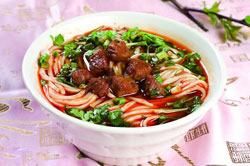Halal Food in China
 In Chinese, halal is called Qingzhen Cai (清真菜). Hahal food is easy to find in most major cities in China given the large Muslim population in China. Small Muslim restaurants and food stalls are also widely available in cities or towns because of the number of Muslim migrants from western China. Muslim restaurants in China are usually run by Muslim migrants, and offer cheap halal food given the greater prevalence of these meats in the cuisine of western Chinese regions.
In Chinese, halal is called Qingzhen Cai (清真菜). Hahal food is easy to find in most major cities in China given the large Muslim population in China. Small Muslim restaurants and food stalls are also widely available in cities or towns because of the number of Muslim migrants from western China. Muslim restaurants in China are usually run by Muslim migrants, and offer cheap halal food given the greater prevalence of these meats in the cuisine of western Chinese regions. Chinese halal food appeared over 1,000 years ago during the Tang Dynasty when Islam was introduced to China. Arabic businessmen, travelers and missionaries traveled to China along the ancient Silk Road, and settled in places like Xian, Kaifeng, Guangzhou, Quanzhou, Yangzhou and Hangzhou. These Arabic people were the ancestors of today’s Hui people in China. Chinese hahal food developed, and more dishes were created during the Yuan Dynasty when the Hui ethnic minority was formed.
Chinese halal food blendes the original Middle East flavors with traditional Chinese dishes, creating its own style. Wheat food and products are eaten more frequently than rice, and various dishes and snacks are made from wheat flour. Sweet flavors take an important role, probably related to Arabian Muslims' preference for a sweet taste. Beef and mutton are also widely eaten.

